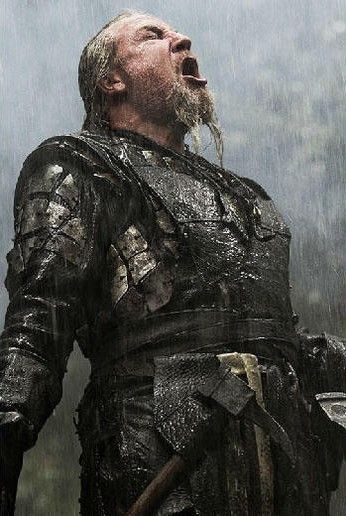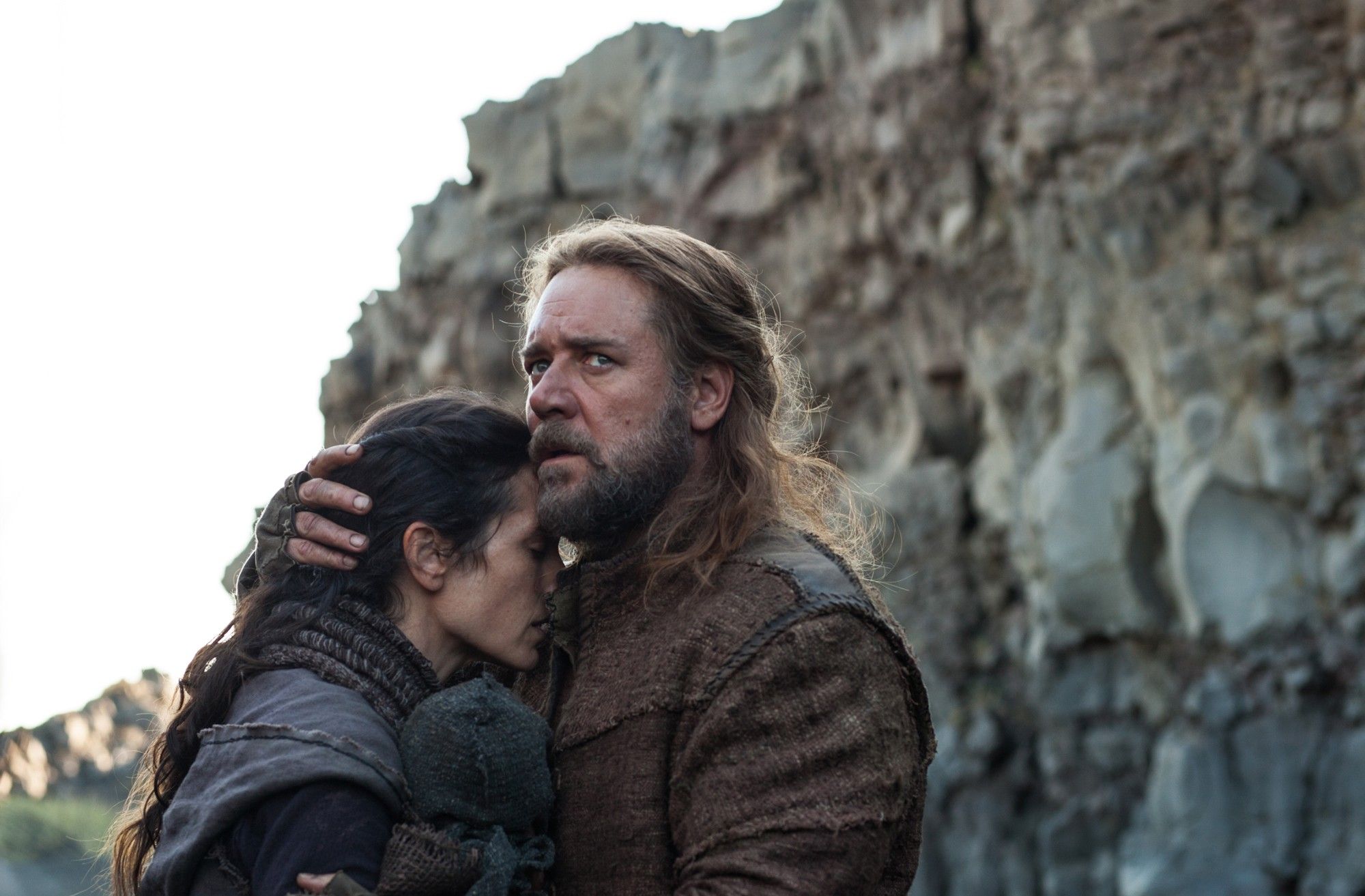Given its visual splendor and epic sweep, Noah might have been a terrific 3D movie, but that would have given the film’s landscape two more dimensions than either the characters or the story. Darren Aronofsky, who previously directed Requiem For a Dream, The Wrestler and Black Swan, lends enormous visual panache to his long-gestating interpretation of the Biblical story of Noah’s Ark. But as with his previous work, Aronofsky demonstrates he’s more gifted with concepts and technique than subtext or themes, which is why Noah is a compelling and yet totally silly adventure that works because, and in spite, of the fact that it pronounces every idea it possibly hopes to communicate.
Russell Crowe plays Noah, a devout naturalist who obeys the will of the Creator by taking only enough from the land for his family to survive, and nothing more. When other men savage nature and plunder Earth’s resources, including through the killing of other men, Noah receives a vision from the Creator to build an Ark, and fill it with two of every animal in order to repopulate the planet after it’s washed clean with a flood. Although Noah is unsure how to accomplish this enormous task, the Creator provides him with means to collect the animals, as he enlists the help of the Watchers, beings of light trapped on Earth whose gargantuan, rock-like bodies enable them to build the enormous boat.
When Tubal-cain (Ray Winstone), the self-proclaimed leader of men, comes to Noah demanding to be admitted on the Ark, Noah refuses, even as he begins to question the task of ridding Earth of man’s destructive influence. But when the demands of the Creator’s task alienate him from his sons Ham (Logan Lerman) and Shem (Douglas Booth), adoptive daughter Ila (Emma Watson) and wife Naameh (Jennifer Connelly), Noah begins to feel the weight of his challenge, even as he wonders whether his virtues and those of his family make them worthy of being saved while the rest of humanity is extinguished.
Although he may be interested in the notion of faith, Aronofksy is no theologian, and he approaches the fable from a strictly cinematic perspective, adapting the story more directly from his own graphic novel than from the Bible itself. In fact, the way in which he approaches it is quite clever, skillfully avoiding judgments or even distinctions between strict creationism and evolution by showcasing the way in which one effectively leads to the other. Using a combination of hyper-stylized images and stunningly realistic (if impossible) time-lapse photography, Aronofsky documents the planet’s evolution – and the subsequent destruction of its resources by man – as a spiritual-fantastical synthesis that serves merely as a foundation for storytelling, rather than a religious debate.
But the problem with the Ark story since its creation (no pun intended) is that it’s logistically impossible, which makes its execution by necessity seem implausible (at best). Aronofsky skirts this issue by quietly including certain anachronisms – clothing, metallurgy – while completely indulging in the only kind of fantasy backdrop that could make any of this possible. The rock-Transformers creatures, the Watchers, provide the muscle for Noah’s assembly of the Ark, while the animals arrive in great waves, of their own volition, and able to coexist peacefully thanks to a magical concoction from Naameh that puts them to sleep for the duration of their stay. Although there’s nothing inherently problematic with these “explanations,” they effectively provide Noah with indisputable proof of a higher power – eliminating the possibility of the film being a true examination of man’s faith.
Ironically, that makes for a more interesting movie – the Watchers are by far the best Transformers ever put on film, and their defense of the Ark rivals the attack of the Ents at the end of The Lord of the Rings: The Two Towers. But other than the seamless, understated combination of spirituality and science in his depiction of creation, Aronofsky’s ideas are straightforward, which isn’t so much a problem as a disappointment. That he essentially made a $150 million character study is indisputably a remarkable achievement, but that he subjected the title character to the simplest and most obvious quandary possible reduces his theological and fantastical themes to background noise, especially when paired with storytelling that’s cartoonish and simplistic.
Speaking of which, narrative convergence is an important, and often effective, screenwriting tool because it (supposedly) ties up all of the character developments and plot strands in a neat bow that maximizes conflict and reinforces a film’s themes. But even for a film so ambitious it’s frequently silly, the climax of Noah suffers from a sense of almost outright desperation, sort of waiting until everything else has escalated or gone wrong to throw all of the individual problems into a pot together, and rather than intensifying the experience, it undermines its believability. What starts as an immersive epic devolves into a wannabe blockbuster, and one without the conviction to retain its discordant ideas and defy a conventional resolution.
Crowe attacks the material with his typical intensity, and brilliantly underplays the character’s interior journey, even when it’s largely externalized in his and everyone else’ behavior. Connelly remains an incredibly gifted actress, and she makes the most of her role as Noah’s companion, even if Aronofksy either overwrites or over-directs her in a sequence which should be the centerpiece of her performance. Watson, meanwhile, does a lot of pregnant-belly acting, and seems a little lost in the material, perhaps not quite possessed yet of enough presence on screen to provide commensurate gravitas to match the material’s self-seriousness. And Lerman, quickly maturing as a performer, offers a convincingly wide-eyed interpretation of Ham, a young man whose journey is much more interesting and complex than his father’s, but the film plays that arc for its impact on the story rather than the character, and his work suffers as a result.
Meanwhile as the film’s villain, Winstone is given an unenviable task – namely, embodying all of the worst qualities of humanity – and much to his credit, he gets close to humanizing Tubal-cain through the character’s disappointment, even sense of betrayal, over the Creator’s failure to speak to him. But the film’s vilification of man is so complete that quite frankly we want Noah to sail off and leave the rest of his kind to die, which movie-conflict notwithstanding, should be more complicated – and moreover, not merely addressed in passing by Noah’s children when they ask if some of the people left to die weren’t completely terrible.
But again, the film seems less interested in all of that than vividly bringing to life the “true” story of the Ark, without communicating anything so specific as a message, and yet without leaving anything so vague as a question. Vaguely, it’s about the environment, man’s inhumanity, faith, religious devotion and personal conviction, but it’s too distracted by form to commit clearly to its function. Ultimately, this massive, unwieldy opus feels adrift in its own ambition, which is why it seems like what you bring to the film is also what you will ultimately take away from it.
Of course, if part of what you bring is that Aronofsky is a genius, you’ll no doubt see plenty of evidence to justify those feelings. But even if they’re impressed by the breadth of what he accomplishes on screen, or invigorated by the ideas Noah flirts with, skeptics will likely have many more questions for the film’s creator than for their own.
Noah opens today nationwide.



